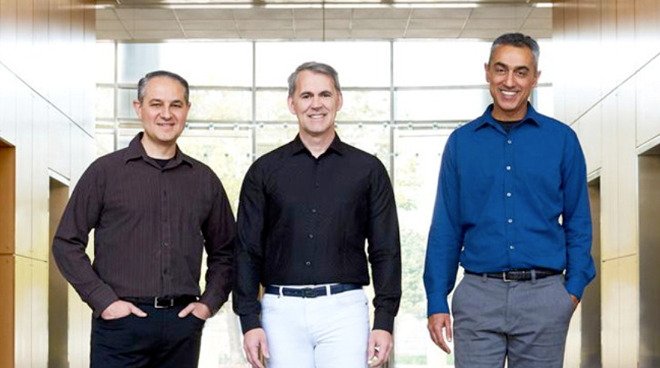Apple drops employment lawsuit against ex-chip architect
Apple has filed to drop its lawsuit against Nuvia co-founder Gerrard Williams III, one that accused the former chip architect of a breach of contract and poaching employees.

Gerard Williams III (middle) with fellow Nuvia co-founders John Bruno (left) and Manu Gulati (right)
In 2019, Apple sued the former iPhone and iPad processor designer Williams for breach of contract. Over three years later, Apple filed to drop the suit.
The request was filed in state court in San Jose, California earlier in the week, according to Bloomberg, however the filing doesn't say why it was dropped at all. Apple didn't respond to a requests for comment on Friday over the filing.
The lawsuit originally alleged that Williams had used his years of access to Apple's information to start Nuvia, in a field he worked on at Apple. At the time, the iPhone maker's filing said that "by 2018, Williams had started his new venture on Apple's dime."
Williams also allegedly took measures to avoid "written communications that he thought Apple could find," such as by phoning potential recruits or used Nuvia colleagues to contact them on his behalf.
In response, Williams filed a counterargument insisting the anti-competitive clauses were against the state legislature. The court allowed the suit to continue despite Williams' "notice of demurrer."
By January 2021, Nuvia was acquired by Qualcomm for $1.4 billion.
Read on AppleInsider

Gerard Williams III (middle) with fellow Nuvia co-founders John Bruno (left) and Manu Gulati (right)
In 2019, Apple sued the former iPhone and iPad processor designer Williams for breach of contract. Over three years later, Apple filed to drop the suit.
The request was filed in state court in San Jose, California earlier in the week, according to Bloomberg, however the filing doesn't say why it was dropped at all. Apple didn't respond to a requests for comment on Friday over the filing.
The lawsuit originally alleged that Williams had used his years of access to Apple's information to start Nuvia, in a field he worked on at Apple. At the time, the iPhone maker's filing said that "by 2018, Williams had started his new venture on Apple's dime."
Williams also allegedly took measures to avoid "written communications that he thought Apple could find," such as by phoning potential recruits or used Nuvia colleagues to contact them on his behalf.
In response, Williams filed a counterargument insisting the anti-competitive clauses were against the state legislature. The court allowed the suit to continue despite Williams' "notice of demurrer."
By January 2021, Nuvia was acquired by Qualcomm for $1.4 billion.
Read on AppleInsider

Comments
Yes, he may have been shown, taught and worked with superior technologies, and while he was employed at Apple, his job was to learn and become an expert in using these technologies. But, as anyone can do, you can master a topic, and eventually - in some cases - improve upon it. Instead of fighting to promote change and the bureaucracy internally, this man chose to cut ties with Apple - and promote his ideas himself.
Good on him. Roger Ross (creator of RISC computing) started life off with Motorola, and with a small team produced the first RISC 88000 Motorola RISC processor family. Internal strife within Motorola, in Austin, TX (yeah, I was there at the time) was frustrating. So he left, and most of the interns that helped him (because Motorola Sr. Managment "re-routed" his Sr. Engineering requisitions) took very high paying jobs with SPARC, and went on to create the HyperSPARC architecture. At the time, they did very well for a start up. Motorola tried unsuccessfully to invoke non-competitive clauses to stop Roger, but the principle outlined above, won in Texas court, time and again.
Insider white-collar knowledge/trading theft is rarely prosecuted successfully through civil or criminal courts, the system is mainly designed to take care of blue collar crime, all the gentry stuff goes by the wayside. The Wright Brothers found that out (Jarndyce v Jarndyce), they won but lost.